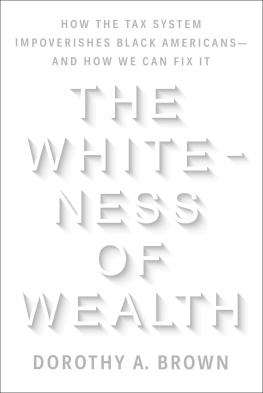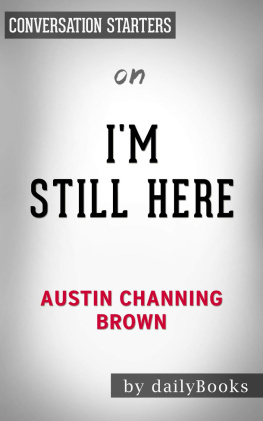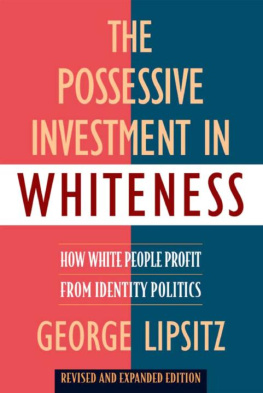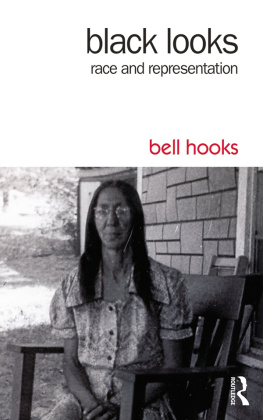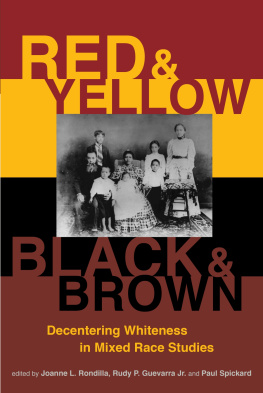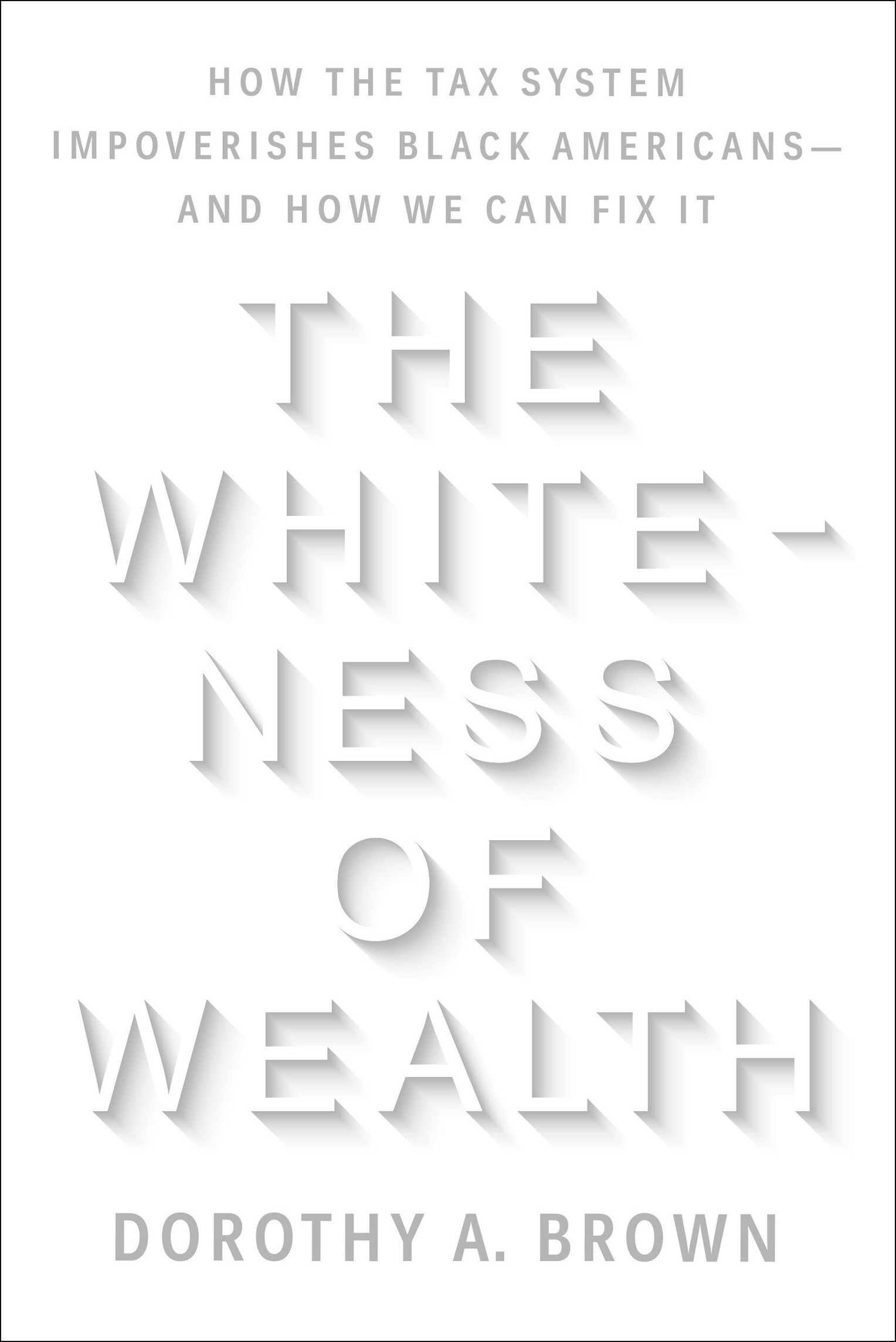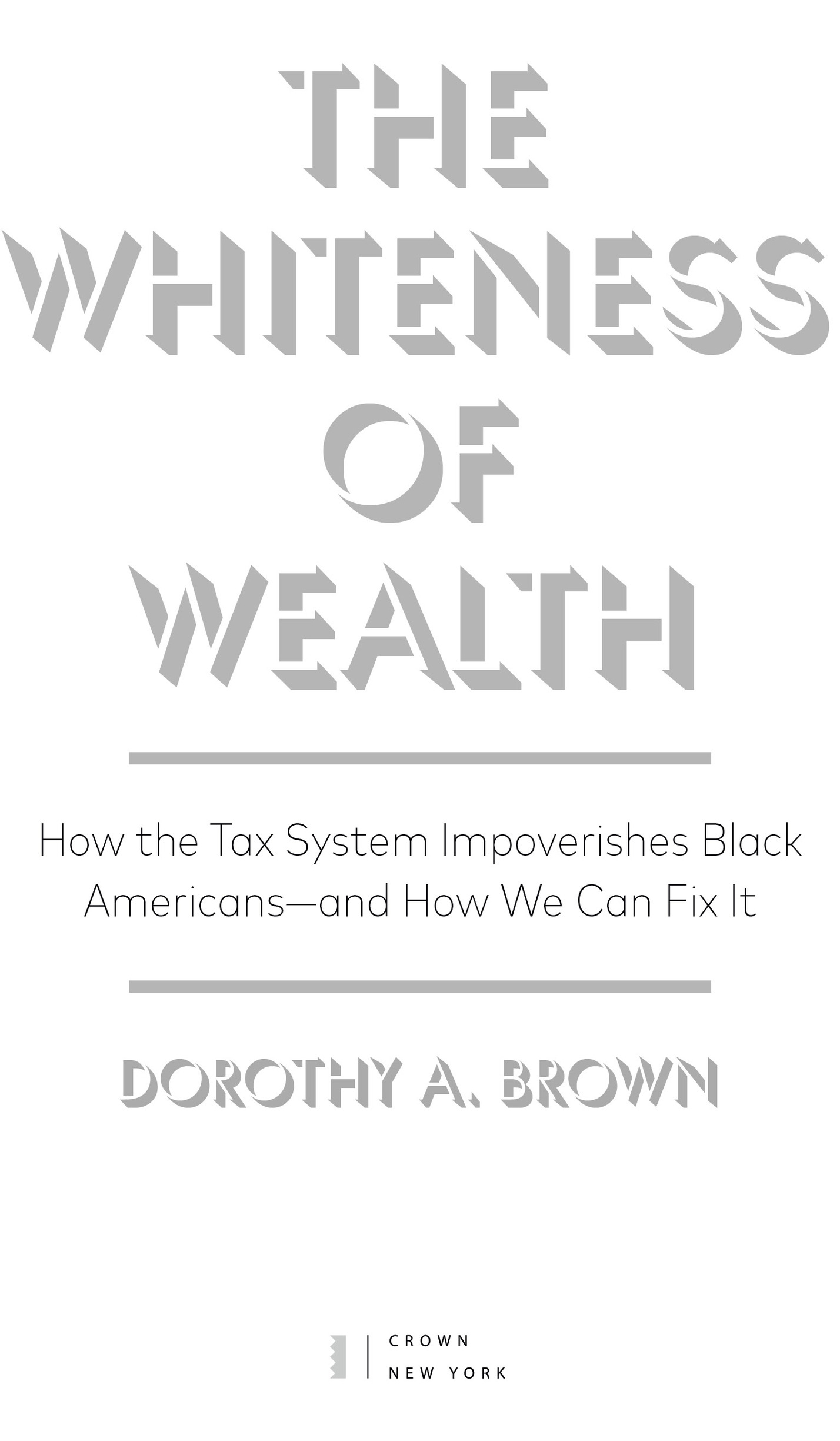Copyright 2021 by Dorothy A. Brown
All rights reserved.
Published in the United States by Crown, an imprint of Random House, a division of Penguin Random House LLC, New York.
Crown and the Crown colophon are trademarks of Penguin Random House LLC.
Names: Brown, Dorothy A., author.
Title: The whiteness of wealth / Dorothy A. Brown.
Description: New York : Crown, [2021] | Includes bibliographical references and index.
Identifiers: LCCN 2020047390 (print) | LCCN 2020047391 (ebook) | ISBN 9780525577324 (hardcover) | ISBN 9780525577348 (ebook)
Subjects: LCSH: TaxationLaw and legislationUnited States. | TaxationMoral and ethical aspectsUnited States. | African AmericansTaxation. | African AmericansEconomic conditions. | RacismEconomic aspectsUnited States. | Tax incidenceUnited States. | Fiscal policyUnited States.
Classification: LCC KF6289 .B753 2021 (print) | LCC KF6289 (ebook) | DDC 343.7304089dc23
I became a tax lawyer to get away from race.
I was born and raised in the South Bronx in New York City. My father, James, was a plumber who worked, without benefits, for a private company, because black men couldnt join the union that controlled the good public-sector jobs. My mother, Dottie, was a nurse and a seamstress who had left her job as a garment factory floor girl because she knew she could do better work than the white seamstresses who got all the opportunities. We lived in a three-family house at 1061 Morris Avenue, purchased with the help of a $6,000 loan from my fathers white boss, and rented the upper and middle apartments to black tenants who became more like family. We didnt have a lot, but we had food on the table and clothes on our backs (handmade by my mother, of course), and my sister and I had a little bit of spending money. My parents had lived through the Jim Crow era and faced laws dictating what they could earn, what they could own, and where they could live, but they were determined that their childrens generation would get educated and live on their own terms.
As a little girl, I believed that was a possibility.
Then, when I was around nine or ten years old, I left the house one day with my mother. I held her hand as we walked to the corner of 166th Street and waited for the light to change. A police car drove by, and as it passed I spotted a handcuffed black man in the backseat. Sitting beside him was a white officer, beating him. It was broad daylight.
I turned in horror to confirm that my mother was seeing this, too. In a low, emotionless voice, she said, That happens sometimes.
My eyes returned to the car. The handcuffed man and I made eye contact. As the police car turned the corner, I held his gaze until I could no longer see him.
Normally my mother was no shrinking violet when it came to fighting racism. My sister and I would cringe whenever a white store manager chose to wait on a white customer before us; we knew what was about to happen, and it happened a lot.
Excuse me! my mother would say. We were here first! She would not use her inside voice, and she wouldnt budge from the head of the line. Standing her groundthats Dottie Brown.
So when I saw that man in the back of the police car, my mothers reaction told me there was not a thing either one of us could do about it.
And thats how I became a tax lawyer. Because I learned early on that people might look at me and see black, but as far as tax law was concerned, the only color that mattered was green. I attended Fordham University and majored in accounting, then got my law degree from Georgetown and earned a masters in tax law from NYU. Tax law was about math, and I was sure Id chosen a career where race had nothing to do with my work.
I have never been more wrong about anything in my life.
As I got older, things started looking up for my parents; when my sister and I were teenagers, my mother went back to work full-time as a licensed practical nurse, and my father, finally allowed in the union, got a job with the New York City Housing Authority. They were both earning a good living, with my father sometimes having a slight edge because of all the overtime he could make. On holidays, Id ask him why he was so happy to head out to work on his day off. Triple time! hed say, grinning as he walked out the door.
Imagine my surprise, years later, when I began preparing their tax returns and realized that triple time had actually cost my parents a bundle in taxes over the course of their life together.
After law school, I spent a couple of years working on Wall Street as an investment banker. My income was around $75,000roughly equivalent to my parents combined incomesbut when I compared our tax payments, I always came away thinking they were paying too much. It didnt make sense; what I had been taught about our progressive tax rate system was that the more money you make, the higher the tax rate that applies to your income. It is based on a concept called ability to pay: If you have more, you should pay more. Each of my parents made half of what I did, so I should be paying much higher taxes than my parents. The numbers did not add up, and in my mind numbers never lied.
The puzzle gnawed at me throughout my career, until I became a tax law professor. As an investment banker working on municipal finance, Id had many black colleagues, because we were working with cities that had black leadership and therefore hired black finance professionals. (Corporate investment banking is a much whiterand much better-payingfield.) That changed when I joined a law firm and continued in the academy: I was the only black woman on the faculty at what was then called George Mason University School of Law (now Antonin Scalia Law School). It was a decade and two jobs later before I could count myself one of two. Race was a factor in my day-to-day life in a way that it had rarely been before.
George Mason was a tough environment for me as the lone black female law professor, made all the more difficult by the timing of my arrival in the summer of 1991. Another black female law professor at the University of Oklahoma College of Law, Anita Hill, was at the center of a national storm after accusing Clarence Thomas, a Supreme Court nominee, of sexual harassment. While I believed Anita, my only black colleaguea manwas working to support Thomass confirmation as he testified before the Senate Judiciary Committee.
As for my white colleagues, the kindest thing I could say was that they were clueless when it came to race. Less kind, but equally true, was that they treated me differently because I was black. One colleaguewho would later use the N-word in classcame to me out of the blue and asked me why all the black students sat together at lunch. I replied:

